Organisational Behaviour Report: Unilever Case Study and Analysis
VerifiedAdded on 2023/06/06
|13
|4479
|119
Report
AI Summary
This report provides an in-depth analysis of organisational behaviour, using Unilever as a case study. It explores the impact of organisational culture and employee motivation on workplace behaviour and performance, discussing various theories such as the Schein Model and Maslow's Need Hierarchy. The report examines the benefits of teamwork, the required skills for effective teams, and how team members and leaders can manage conflicts and develop roles. Furthermore, it critically evaluates group development theories and assesses how effective teams relate to organisational behaviour concepts within Unilever. The report concludes with a reflection on the value and relevance of effective team working in influencing cultural behaviour within the workplace.
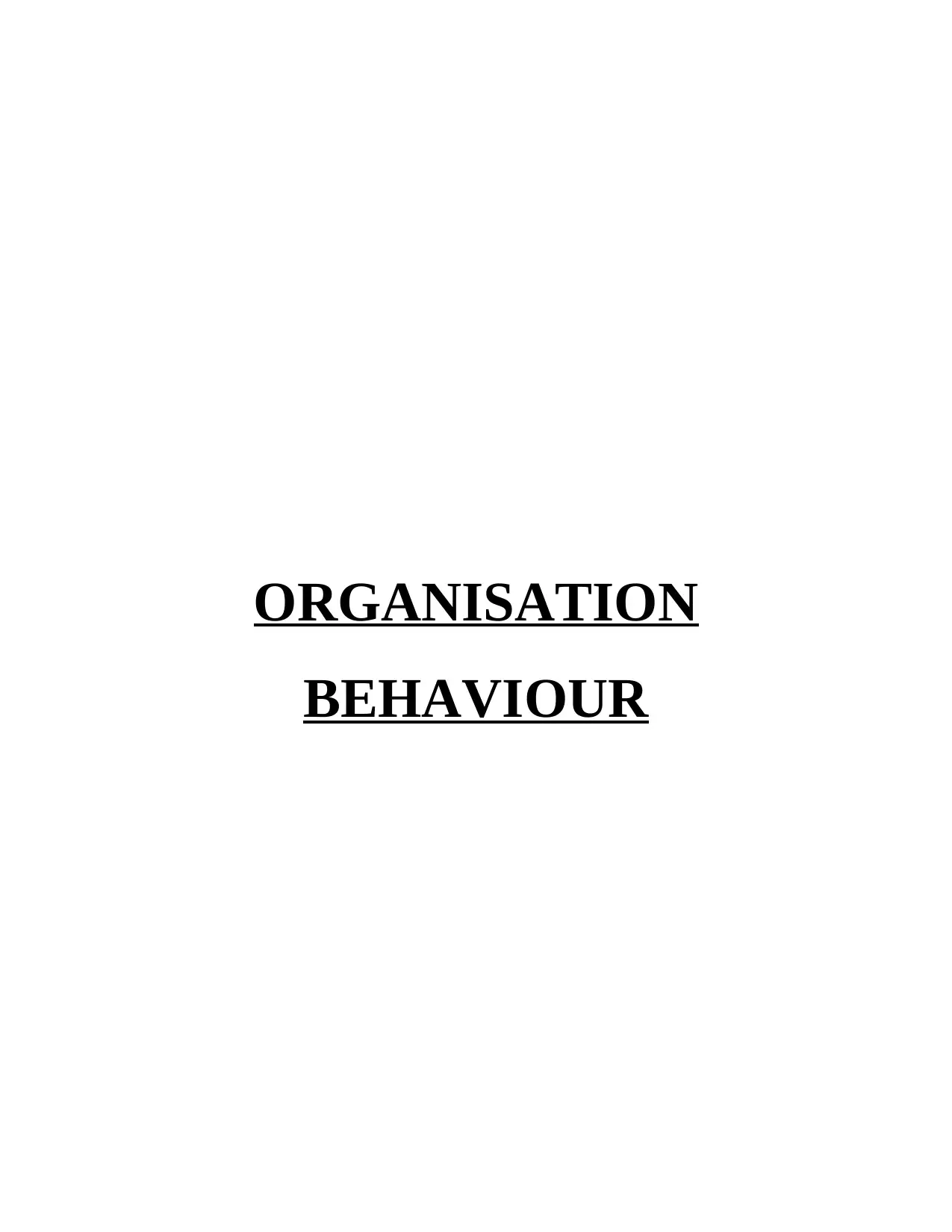
ORGANISATION
BEHAVIOUR
BEHAVIOUR
Paraphrase This Document
Need a fresh take? Get an instant paraphrase of this document with our AI Paraphraser
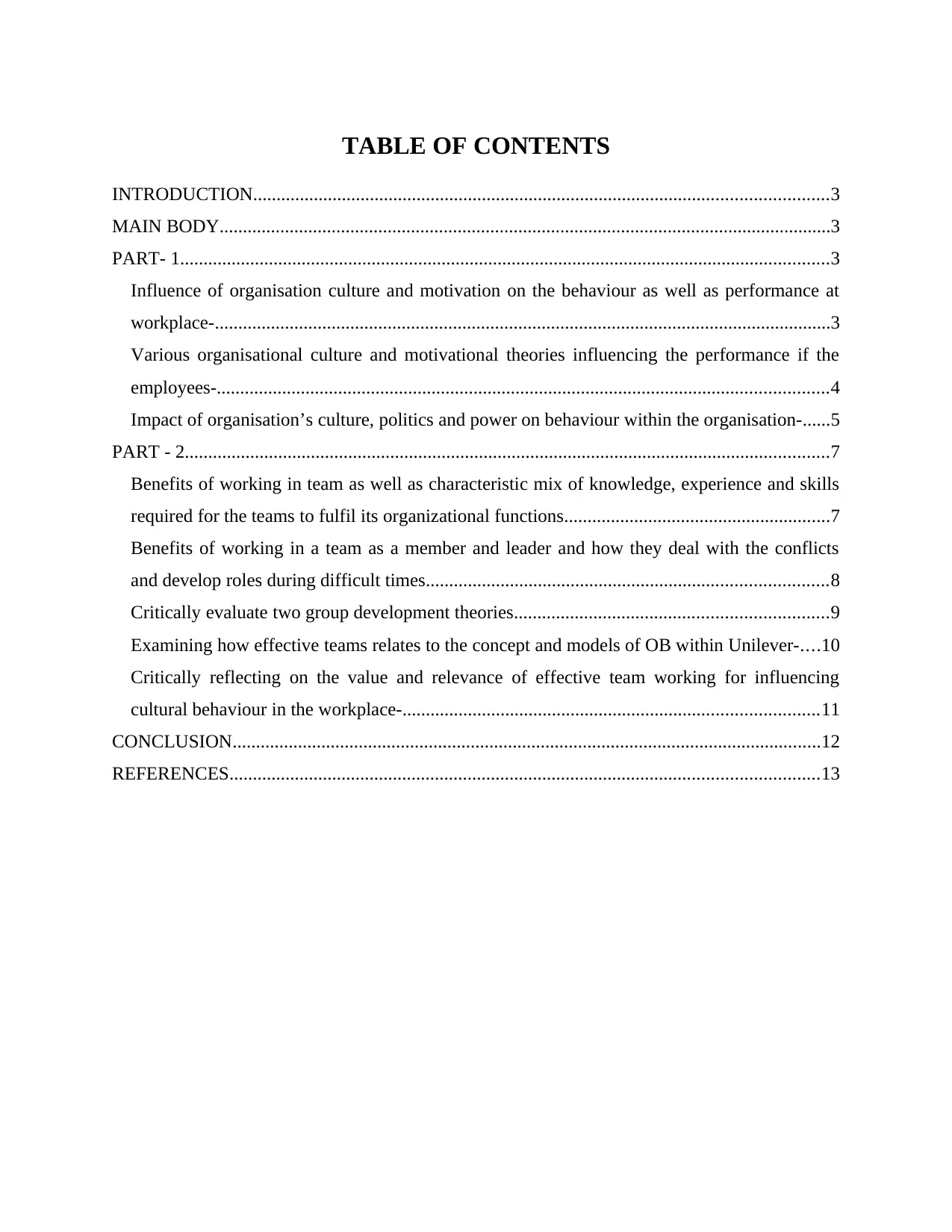
TABLE OF CONTENTS
INTRODUCTION...........................................................................................................................3
MAIN BODY...................................................................................................................................3
PART- 1...........................................................................................................................................3
Influence of organisation culture and motivation on the behaviour as well as performance at
workplace-....................................................................................................................................3
Various organisational culture and motivational theories influencing the performance if the
employees-...................................................................................................................................4
Impact of organisation’s culture, politics and power on behaviour within the organisation-......5
PART - 2..........................................................................................................................................7
Benefits of working in team as well as characteristic mix of knowledge, experience and skills
required for the teams to fulfil its organizational functions.........................................................7
Benefits of working in a team as a member and leader and how they deal with the conflicts
and develop roles during difficult times......................................................................................8
Critically evaluate two group development theories...................................................................9
Examining how effective teams relates to the concept and models of OB within Unilever-....10
Critically reflecting on the value and relevance of effective team working for influencing
cultural behaviour in the workplace-.........................................................................................11
CONCLUSION..............................................................................................................................12
REFERENCES..............................................................................................................................13
INTRODUCTION...........................................................................................................................3
MAIN BODY...................................................................................................................................3
PART- 1...........................................................................................................................................3
Influence of organisation culture and motivation on the behaviour as well as performance at
workplace-....................................................................................................................................3
Various organisational culture and motivational theories influencing the performance if the
employees-...................................................................................................................................4
Impact of organisation’s culture, politics and power on behaviour within the organisation-......5
PART - 2..........................................................................................................................................7
Benefits of working in team as well as characteristic mix of knowledge, experience and skills
required for the teams to fulfil its organizational functions.........................................................7
Benefits of working in a team as a member and leader and how they deal with the conflicts
and develop roles during difficult times......................................................................................8
Critically evaluate two group development theories...................................................................9
Examining how effective teams relates to the concept and models of OB within Unilever-....10
Critically reflecting on the value and relevance of effective team working for influencing
cultural behaviour in the workplace-.........................................................................................11
CONCLUSION..............................................................................................................................12
REFERENCES..............................................................................................................................13
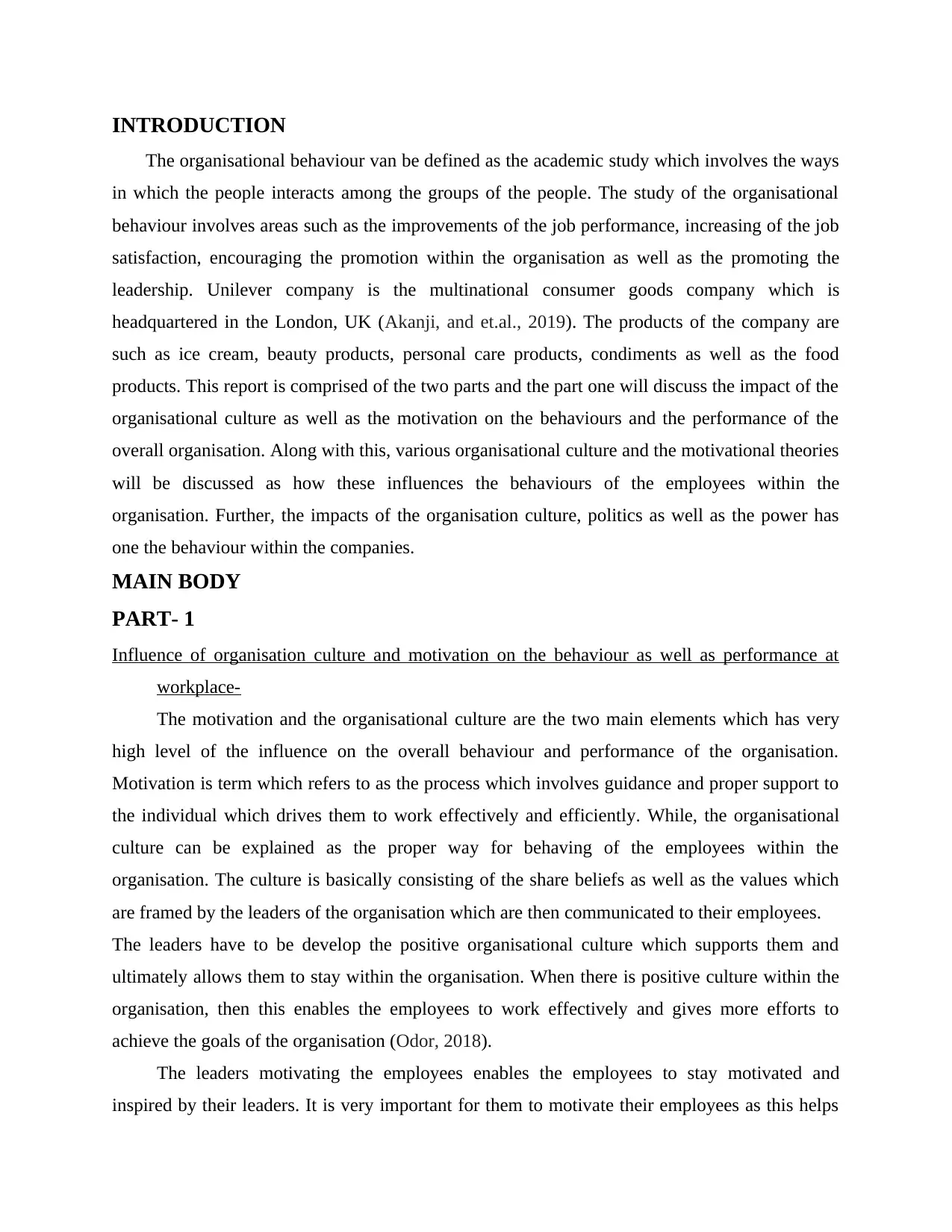
INTRODUCTION
The organisational behaviour van be defined as the academic study which involves the ways
in which the people interacts among the groups of the people. The study of the organisational
behaviour involves areas such as the improvements of the job performance, increasing of the job
satisfaction, encouraging the promotion within the organisation as well as the promoting the
leadership. Unilever company is the multinational consumer goods company which is
headquartered in the London, UK (Akanji, and et.al., 2019). The products of the company are
such as ice cream, beauty products, personal care products, condiments as well as the food
products. This report is comprised of the two parts and the part one will discuss the impact of the
organisational culture as well as the motivation on the behaviours and the performance of the
overall organisation. Along with this, various organisational culture and the motivational theories
will be discussed as how these influences the behaviours of the employees within the
organisation. Further, the impacts of the organisation culture, politics as well as the power has
one the behaviour within the companies.
MAIN BODY
PART- 1
Influence of organisation culture and motivation on the behaviour as well as performance at
workplace-
The motivation and the organisational culture are the two main elements which has very
high level of the influence on the overall behaviour and performance of the organisation.
Motivation is term which refers to as the process which involves guidance and proper support to
the individual which drives them to work effectively and efficiently. While, the organisational
culture can be explained as the proper way for behaving of the employees within the
organisation. The culture is basically consisting of the share beliefs as well as the values which
are framed by the leaders of the organisation which are then communicated to their employees.
The leaders have to be develop the positive organisational culture which supports them and
ultimately allows them to stay within the organisation. When there is positive culture within the
organisation, then this enables the employees to work effectively and gives more efforts to
achieve the goals of the organisation (Odor, 2018).
The leaders motivating the employees enables the employees to stay motivated and
inspired by their leaders. It is very important for them to motivate their employees as this helps
The organisational behaviour van be defined as the academic study which involves the ways
in which the people interacts among the groups of the people. The study of the organisational
behaviour involves areas such as the improvements of the job performance, increasing of the job
satisfaction, encouraging the promotion within the organisation as well as the promoting the
leadership. Unilever company is the multinational consumer goods company which is
headquartered in the London, UK (Akanji, and et.al., 2019). The products of the company are
such as ice cream, beauty products, personal care products, condiments as well as the food
products. This report is comprised of the two parts and the part one will discuss the impact of the
organisational culture as well as the motivation on the behaviours and the performance of the
overall organisation. Along with this, various organisational culture and the motivational theories
will be discussed as how these influences the behaviours of the employees within the
organisation. Further, the impacts of the organisation culture, politics as well as the power has
one the behaviour within the companies.
MAIN BODY
PART- 1
Influence of organisation culture and motivation on the behaviour as well as performance at
workplace-
The motivation and the organisational culture are the two main elements which has very
high level of the influence on the overall behaviour and performance of the organisation.
Motivation is term which refers to as the process which involves guidance and proper support to
the individual which drives them to work effectively and efficiently. While, the organisational
culture can be explained as the proper way for behaving of the employees within the
organisation. The culture is basically consisting of the share beliefs as well as the values which
are framed by the leaders of the organisation which are then communicated to their employees.
The leaders have to be develop the positive organisational culture which supports them and
ultimately allows them to stay within the organisation. When there is positive culture within the
organisation, then this enables the employees to work effectively and gives more efforts to
achieve the goals of the organisation (Odor, 2018).
The leaders motivating the employees enables the employees to stay motivated and
inspired by their leaders. It is very important for them to motivate their employees as this helps
⊘ This is a preview!⊘
Do you want full access?
Subscribe today to unlock all pages.

Trusted by 1+ million students worldwide
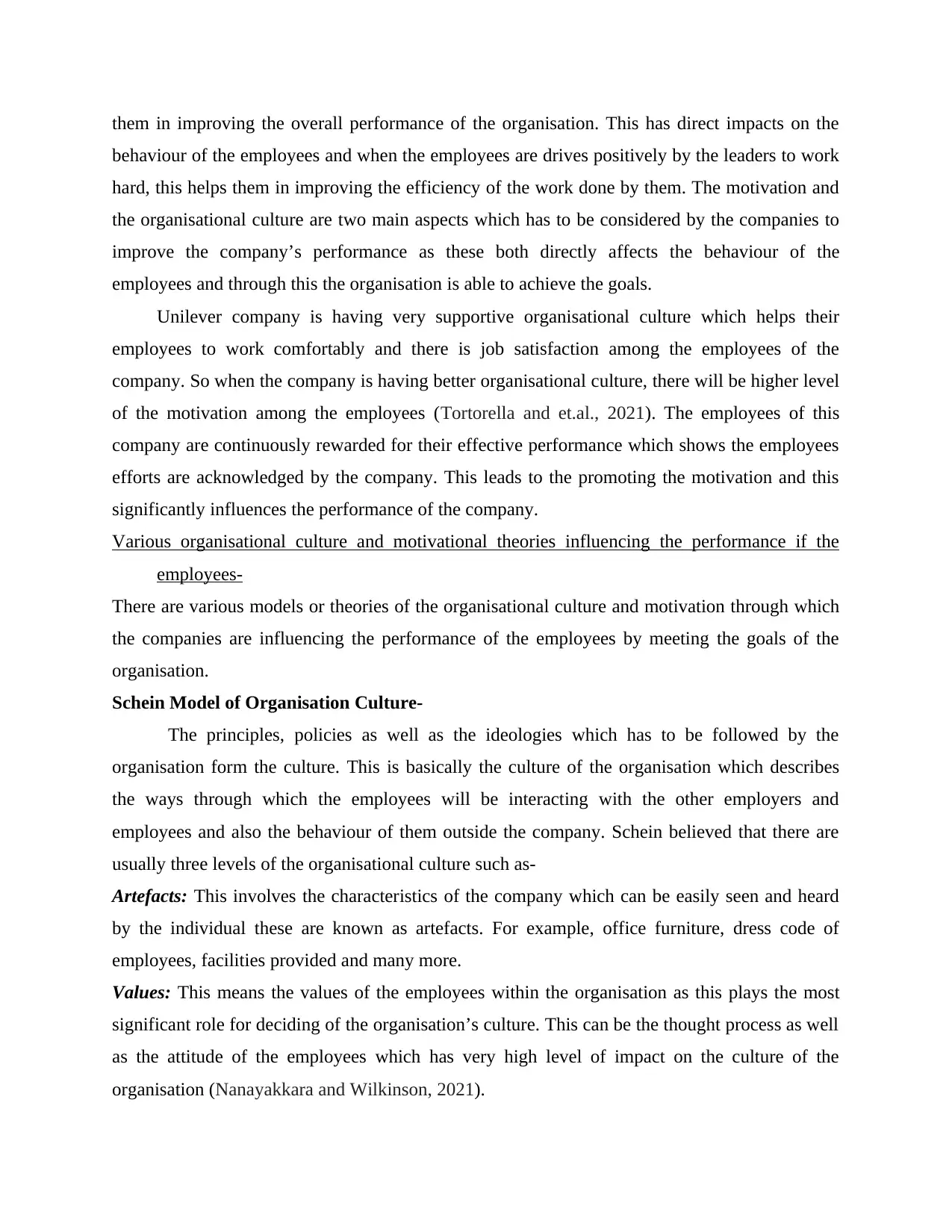
them in improving the overall performance of the organisation. This has direct impacts on the
behaviour of the employees and when the employees are drives positively by the leaders to work
hard, this helps them in improving the efficiency of the work done by them. The motivation and
the organisational culture are two main aspects which has to be considered by the companies to
improve the company’s performance as these both directly affects the behaviour of the
employees and through this the organisation is able to achieve the goals.
Unilever company is having very supportive organisational culture which helps their
employees to work comfortably and there is job satisfaction among the employees of the
company. So when the company is having better organisational culture, there will be higher level
of the motivation among the employees (Tortorella and et.al., 2021). The employees of this
company are continuously rewarded for their effective performance which shows the employees
efforts are acknowledged by the company. This leads to the promoting the motivation and this
significantly influences the performance of the company.
Various organisational culture and motivational theories influencing the performance if the
employees-
There are various models or theories of the organisational culture and motivation through which
the companies are influencing the performance of the employees by meeting the goals of the
organisation.
Schein Model of Organisation Culture-
The principles, policies as well as the ideologies which has to be followed by the
organisation form the culture. This is basically the culture of the organisation which describes
the ways through which the employees will be interacting with the other employers and
employees and also the behaviour of them outside the company. Schein believed that there are
usually three levels of the organisational culture such as-
Artefacts: This involves the characteristics of the company which can be easily seen and heard
by the individual these are known as artefacts. For example, office furniture, dress code of
employees, facilities provided and many more.
Values: This means the values of the employees within the organisation as this plays the most
significant role for deciding of the organisation’s culture. This can be the thought process as well
as the attitude of the employees which has very high level of impact on the culture of the
organisation (Nanayakkara and Wilkinson, 2021).
behaviour of the employees and when the employees are drives positively by the leaders to work
hard, this helps them in improving the efficiency of the work done by them. The motivation and
the organisational culture are two main aspects which has to be considered by the companies to
improve the company’s performance as these both directly affects the behaviour of the
employees and through this the organisation is able to achieve the goals.
Unilever company is having very supportive organisational culture which helps their
employees to work comfortably and there is job satisfaction among the employees of the
company. So when the company is having better organisational culture, there will be higher level
of the motivation among the employees (Tortorella and et.al., 2021). The employees of this
company are continuously rewarded for their effective performance which shows the employees
efforts are acknowledged by the company. This leads to the promoting the motivation and this
significantly influences the performance of the company.
Various organisational culture and motivational theories influencing the performance if the
employees-
There are various models or theories of the organisational culture and motivation through which
the companies are influencing the performance of the employees by meeting the goals of the
organisation.
Schein Model of Organisation Culture-
The principles, policies as well as the ideologies which has to be followed by the
organisation form the culture. This is basically the culture of the organisation which describes
the ways through which the employees will be interacting with the other employers and
employees and also the behaviour of them outside the company. Schein believed that there are
usually three levels of the organisational culture such as-
Artefacts: This involves the characteristics of the company which can be easily seen and heard
by the individual these are known as artefacts. For example, office furniture, dress code of
employees, facilities provided and many more.
Values: This means the values of the employees within the organisation as this plays the most
significant role for deciding of the organisation’s culture. This can be the thought process as well
as the attitude of the employees which has very high level of impact on the culture of the
organisation (Nanayakkara and Wilkinson, 2021).
Paraphrase This Document
Need a fresh take? Get an instant paraphrase of this document with our AI Paraphraser
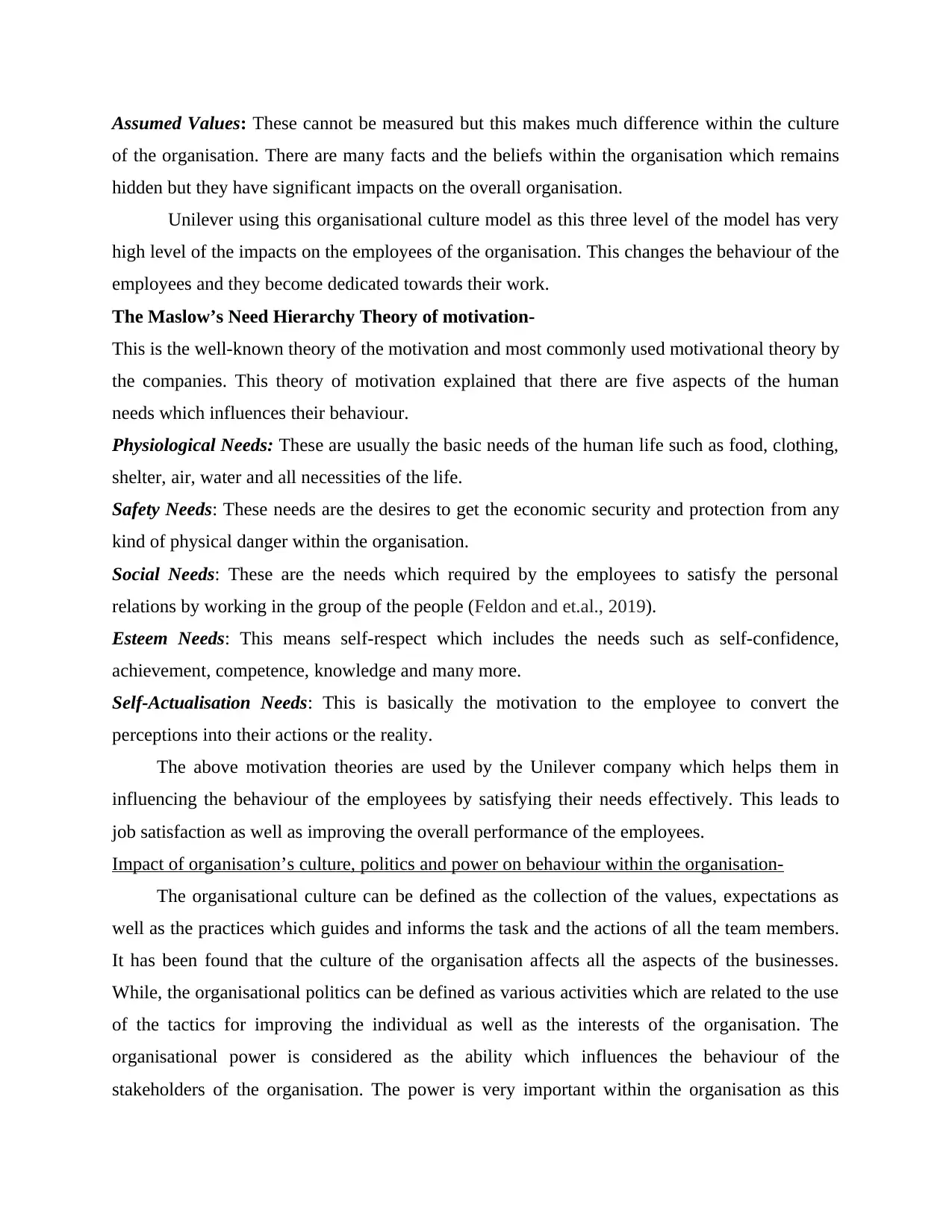
Assumed Values: These cannot be measured but this makes much difference within the culture
of the organisation. There are many facts and the beliefs within the organisation which remains
hidden but they have significant impacts on the overall organisation.
Unilever using this organisational culture model as this three level of the model has very
high level of the impacts on the employees of the organisation. This changes the behaviour of the
employees and they become dedicated towards their work.
The Maslow’s Need Hierarchy Theory of motivation-
This is the well-known theory of the motivation and most commonly used motivational theory by
the companies. This theory of motivation explained that there are five aspects of the human
needs which influences their behaviour.
Physiological Needs: These are usually the basic needs of the human life such as food, clothing,
shelter, air, water and all necessities of the life.
Safety Needs: These needs are the desires to get the economic security and protection from any
kind of physical danger within the organisation.
Social Needs: These are the needs which required by the employees to satisfy the personal
relations by working in the group of the people (Feldon and et.al., 2019).
Esteem Needs: This means self-respect which includes the needs such as self-confidence,
achievement, competence, knowledge and many more.
Self-Actualisation Needs: This is basically the motivation to the employee to convert the
perceptions into their actions or the reality.
The above motivation theories are used by the Unilever company which helps them in
influencing the behaviour of the employees by satisfying their needs effectively. This leads to
job satisfaction as well as improving the overall performance of the employees.
Impact of organisation’s culture, politics and power on behaviour within the organisation-
The organisational culture can be defined as the collection of the values, expectations as
well as the practices which guides and informs the task and the actions of all the team members.
It has been found that the culture of the organisation affects all the aspects of the businesses.
While, the organisational politics can be defined as various activities which are related to the use
of the tactics for improving the individual as well as the interests of the organisation. The
organisational power is considered as the ability which influences the behaviour of the
stakeholders of the organisation. The power is very important within the organisation as this
of the organisation. There are many facts and the beliefs within the organisation which remains
hidden but they have significant impacts on the overall organisation.
Unilever using this organisational culture model as this three level of the model has very
high level of the impacts on the employees of the organisation. This changes the behaviour of the
employees and they become dedicated towards their work.
The Maslow’s Need Hierarchy Theory of motivation-
This is the well-known theory of the motivation and most commonly used motivational theory by
the companies. This theory of motivation explained that there are five aspects of the human
needs which influences their behaviour.
Physiological Needs: These are usually the basic needs of the human life such as food, clothing,
shelter, air, water and all necessities of the life.
Safety Needs: These needs are the desires to get the economic security and protection from any
kind of physical danger within the organisation.
Social Needs: These are the needs which required by the employees to satisfy the personal
relations by working in the group of the people (Feldon and et.al., 2019).
Esteem Needs: This means self-respect which includes the needs such as self-confidence,
achievement, competence, knowledge and many more.
Self-Actualisation Needs: This is basically the motivation to the employee to convert the
perceptions into their actions or the reality.
The above motivation theories are used by the Unilever company which helps them in
influencing the behaviour of the employees by satisfying their needs effectively. This leads to
job satisfaction as well as improving the overall performance of the employees.
Impact of organisation’s culture, politics and power on behaviour within the organisation-
The organisational culture can be defined as the collection of the values, expectations as
well as the practices which guides and informs the task and the actions of all the team members.
It has been found that the culture of the organisation affects all the aspects of the businesses.
While, the organisational politics can be defined as various activities which are related to the use
of the tactics for improving the individual as well as the interests of the organisation. The
organisational power is considered as the ability which influences the behaviour of the
stakeholders of the organisation. The power is very important within the organisation as this
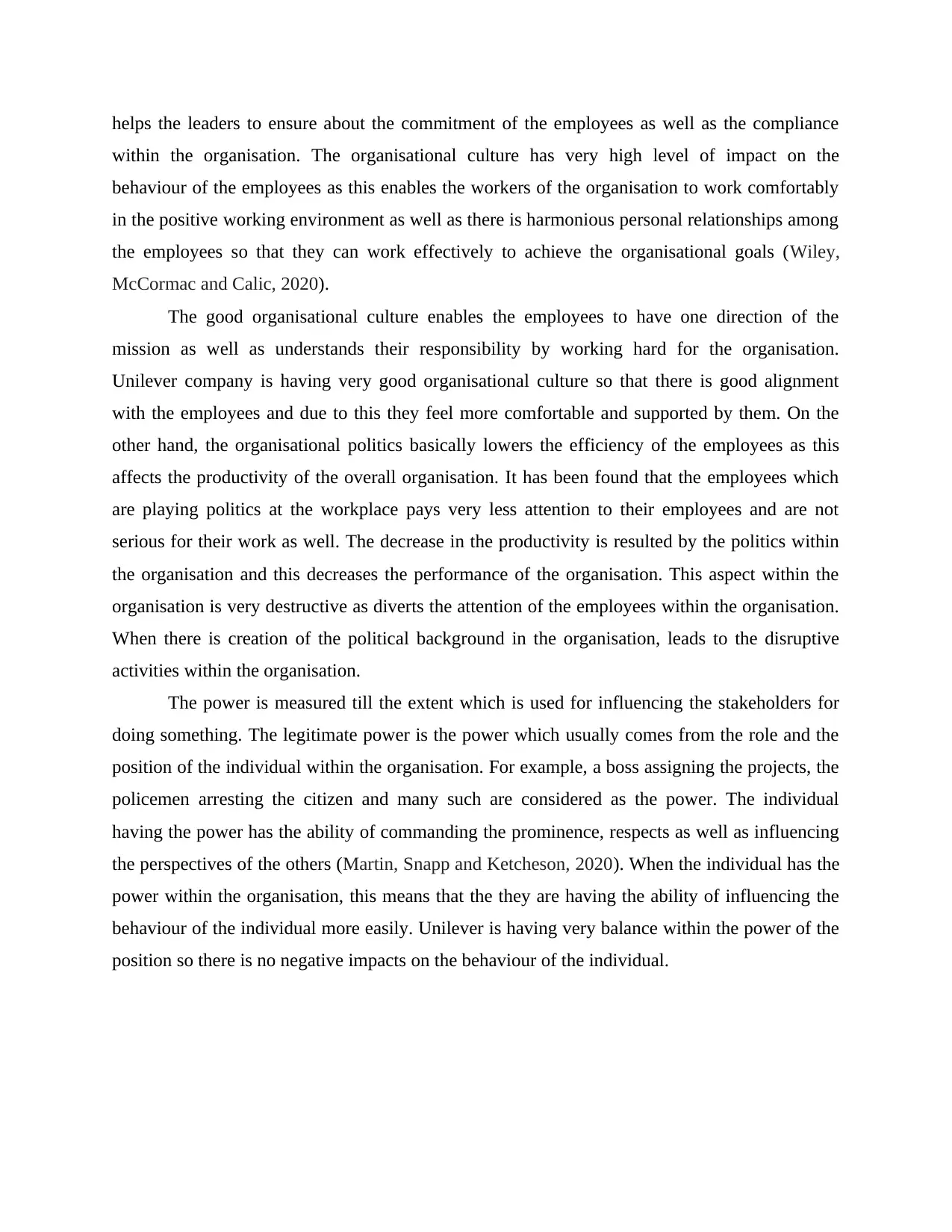
helps the leaders to ensure about the commitment of the employees as well as the compliance
within the organisation. The organisational culture has very high level of impact on the
behaviour of the employees as this enables the workers of the organisation to work comfortably
in the positive working environment as well as there is harmonious personal relationships among
the employees so that they can work effectively to achieve the organisational goals (Wiley,
McCormac and Calic, 2020).
The good organisational culture enables the employees to have one direction of the
mission as well as understands their responsibility by working hard for the organisation.
Unilever company is having very good organisational culture so that there is good alignment
with the employees and due to this they feel more comfortable and supported by them. On the
other hand, the organisational politics basically lowers the efficiency of the employees as this
affects the productivity of the overall organisation. It has been found that the employees which
are playing politics at the workplace pays very less attention to their employees and are not
serious for their work as well. The decrease in the productivity is resulted by the politics within
the organisation and this decreases the performance of the organisation. This aspect within the
organisation is very destructive as diverts the attention of the employees within the organisation.
When there is creation of the political background in the organisation, leads to the disruptive
activities within the organisation.
The power is measured till the extent which is used for influencing the stakeholders for
doing something. The legitimate power is the power which usually comes from the role and the
position of the individual within the organisation. For example, a boss assigning the projects, the
policemen arresting the citizen and many such are considered as the power. The individual
having the power has the ability of commanding the prominence, respects as well as influencing
the perspectives of the others (Martin, Snapp and Ketcheson, 2020). When the individual has the
power within the organisation, this means that the they are having the ability of influencing the
behaviour of the individual more easily. Unilever is having very balance within the power of the
position so there is no negative impacts on the behaviour of the individual.
within the organisation. The organisational culture has very high level of impact on the
behaviour of the employees as this enables the workers of the organisation to work comfortably
in the positive working environment as well as there is harmonious personal relationships among
the employees so that they can work effectively to achieve the organisational goals (Wiley,
McCormac and Calic, 2020).
The good organisational culture enables the employees to have one direction of the
mission as well as understands their responsibility by working hard for the organisation.
Unilever company is having very good organisational culture so that there is good alignment
with the employees and due to this they feel more comfortable and supported by them. On the
other hand, the organisational politics basically lowers the efficiency of the employees as this
affects the productivity of the overall organisation. It has been found that the employees which
are playing politics at the workplace pays very less attention to their employees and are not
serious for their work as well. The decrease in the productivity is resulted by the politics within
the organisation and this decreases the performance of the organisation. This aspect within the
organisation is very destructive as diverts the attention of the employees within the organisation.
When there is creation of the political background in the organisation, leads to the disruptive
activities within the organisation.
The power is measured till the extent which is used for influencing the stakeholders for
doing something. The legitimate power is the power which usually comes from the role and the
position of the individual within the organisation. For example, a boss assigning the projects, the
policemen arresting the citizen and many such are considered as the power. The individual
having the power has the ability of commanding the prominence, respects as well as influencing
the perspectives of the others (Martin, Snapp and Ketcheson, 2020). When the individual has the
power within the organisation, this means that the they are having the ability of influencing the
behaviour of the individual more easily. Unilever is having very balance within the power of the
position so there is no negative impacts on the behaviour of the individual.
⊘ This is a preview!⊘
Do you want full access?
Subscribe today to unlock all pages.

Trusted by 1+ million students worldwide
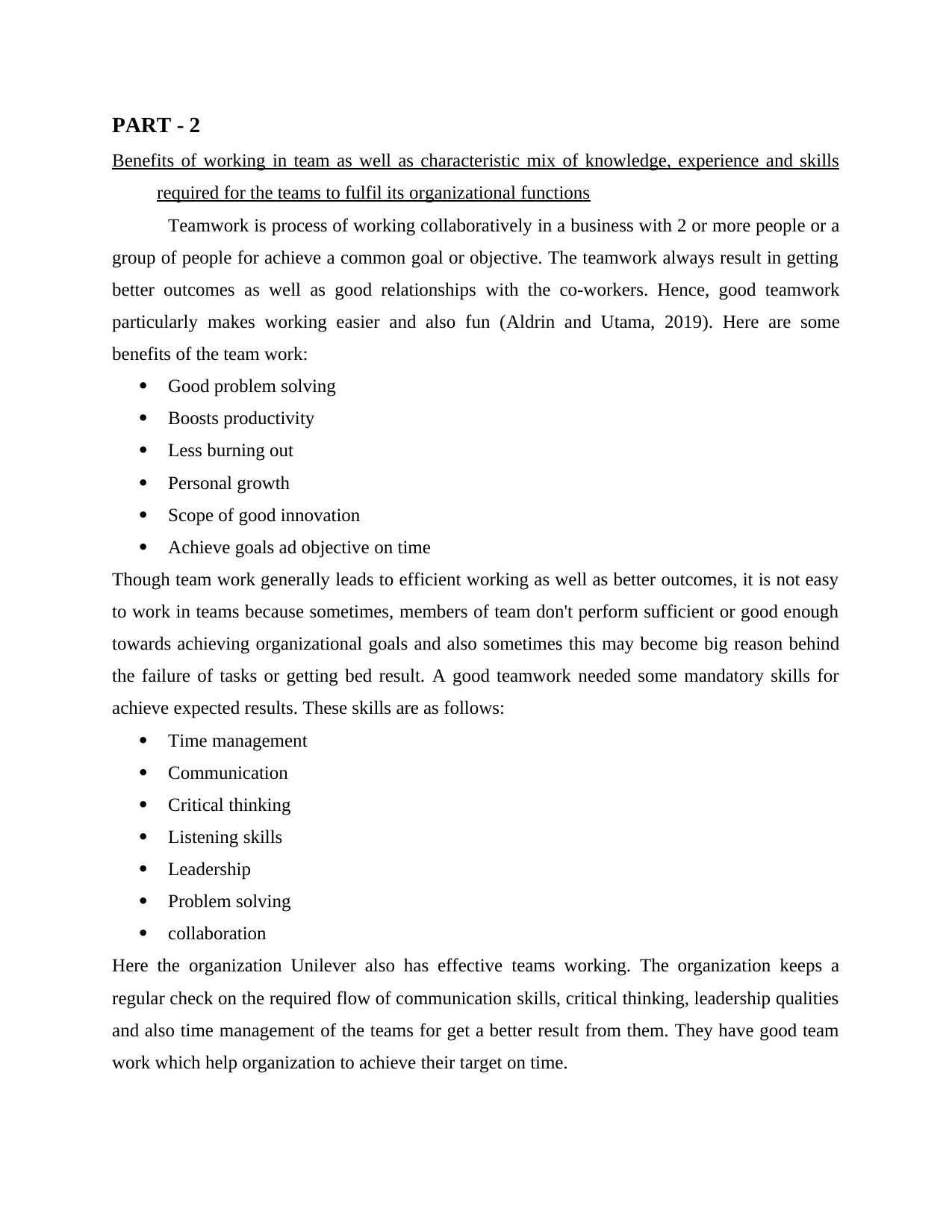
PART - 2
Benefits of working in team as well as characteristic mix of knowledge, experience and skills
required for the teams to fulfil its organizational functions
Teamwork is process of working collaboratively in a business with 2 or more people or a
group of people for achieve a common goal or objective. The teamwork always result in getting
better outcomes as well as good relationships with the co-workers. Hence, good teamwork
particularly makes working easier and also fun (Aldrin and Utama, 2019). Here are some
benefits of the team work:
Good problem solving
Boosts productivity
Less burning out
Personal growth
Scope of good innovation
Achieve goals ad objective on time
Though team work generally leads to efficient working as well as better outcomes, it is not easy
to work in teams because sometimes, members of team don't perform sufficient or good enough
towards achieving organizational goals and also sometimes this may become big reason behind
the failure of tasks or getting bed result. A good teamwork needed some mandatory skills for
achieve expected results. These skills are as follows:
Time management
Communication
Critical thinking
Listening skills
Leadership
Problem solving
collaboration
Here the organization Unilever also has effective teams working. The organization keeps a
regular check on the required flow of communication skills, critical thinking, leadership qualities
and also time management of the teams for get a better result from them. They have good team
work which help organization to achieve their target on time.
Benefits of working in team as well as characteristic mix of knowledge, experience and skills
required for the teams to fulfil its organizational functions
Teamwork is process of working collaboratively in a business with 2 or more people or a
group of people for achieve a common goal or objective. The teamwork always result in getting
better outcomes as well as good relationships with the co-workers. Hence, good teamwork
particularly makes working easier and also fun (Aldrin and Utama, 2019). Here are some
benefits of the team work:
Good problem solving
Boosts productivity
Less burning out
Personal growth
Scope of good innovation
Achieve goals ad objective on time
Though team work generally leads to efficient working as well as better outcomes, it is not easy
to work in teams because sometimes, members of team don't perform sufficient or good enough
towards achieving organizational goals and also sometimes this may become big reason behind
the failure of tasks or getting bed result. A good teamwork needed some mandatory skills for
achieve expected results. These skills are as follows:
Time management
Communication
Critical thinking
Listening skills
Leadership
Problem solving
collaboration
Here the organization Unilever also has effective teams working. The organization keeps a
regular check on the required flow of communication skills, critical thinking, leadership qualities
and also time management of the teams for get a better result from them. They have good team
work which help organization to achieve their target on time.
Paraphrase This Document
Need a fresh take? Get an instant paraphrase of this document with our AI Paraphraser
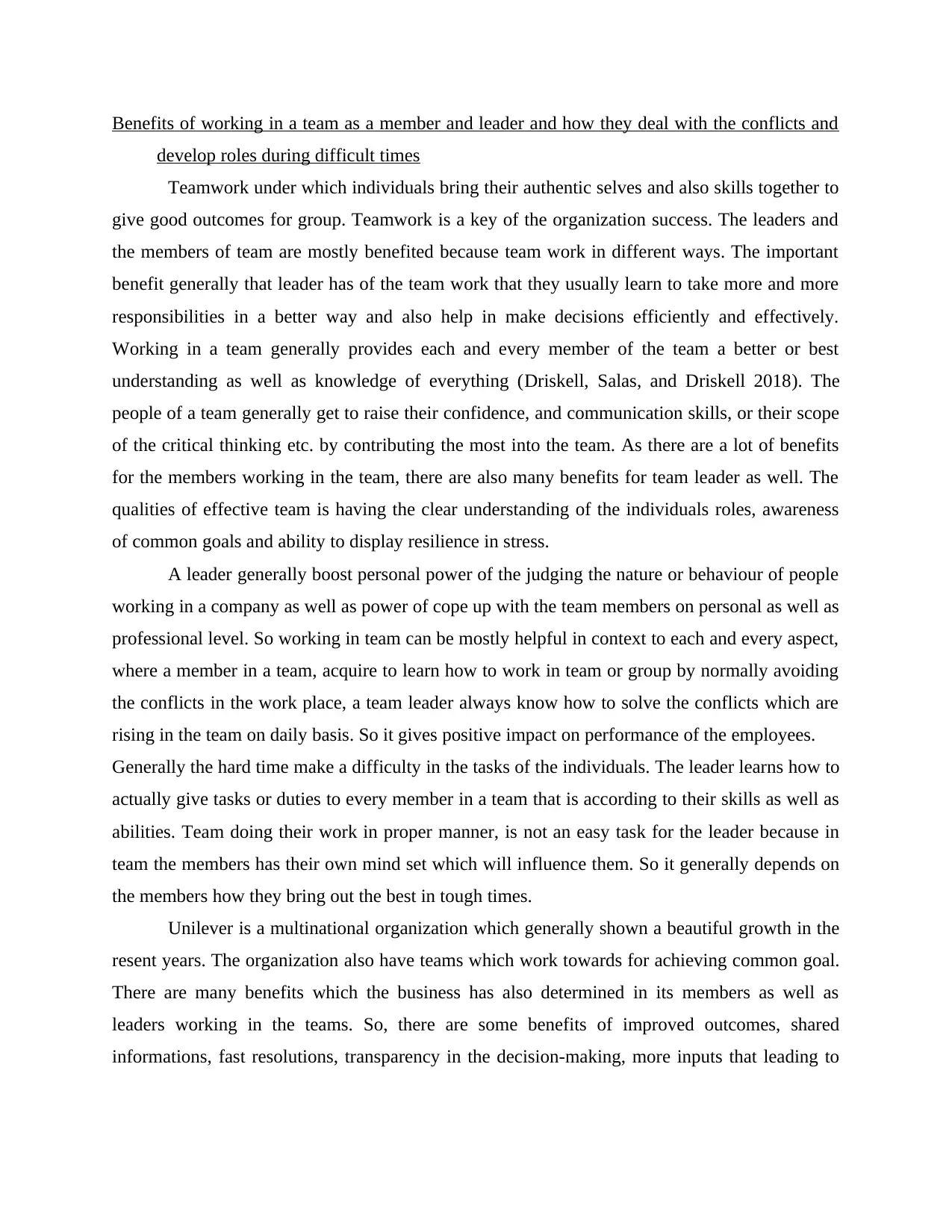
Benefits of working in a team as a member and leader and how they deal with the conflicts and
develop roles during difficult times
Teamwork under which individuals bring their authentic selves and also skills together to
give good outcomes for group. Teamwork is a key of the organization success. The leaders and
the members of team are mostly benefited because team work in different ways. The important
benefit generally that leader has of the team work that they usually learn to take more and more
responsibilities in a better way and also help in make decisions efficiently and effectively.
Working in a team generally provides each and every member of the team a better or best
understanding as well as knowledge of everything (Driskell, Salas, and Driskell 2018). The
people of a team generally get to raise their confidence, and communication skills, or their scope
of the critical thinking etc. by contributing the most into the team. As there are a lot of benefits
for the members working in the team, there are also many benefits for team leader as well. The
qualities of effective team is having the clear understanding of the individuals roles, awareness
of common goals and ability to display resilience in stress.
A leader generally boost personal power of the judging the nature or behaviour of people
working in a company as well as power of cope up with the team members on personal as well as
professional level. So working in team can be mostly helpful in context to each and every aspect,
where a member in a team, acquire to learn how to work in team or group by normally avoiding
the conflicts in the work place, a team leader always know how to solve the conflicts which are
rising in the team on daily basis. So it gives positive impact on performance of the employees.
Generally the hard time make a difficulty in the tasks of the individuals. The leader learns how to
actually give tasks or duties to every member in a team that is according to their skills as well as
abilities. Team doing their work in proper manner, is not an easy task for the leader because in
team the members has their own mind set which will influence them. So it generally depends on
the members how they bring out the best in tough times.
Unilever is a multinational organization which generally shown a beautiful growth in the
resent years. The organization also have teams which work towards for achieving common goal.
There are many benefits which the business has also determined in its members as well as
leaders working in the teams. So, there are some benefits of improved outcomes, shared
informations, fast resolutions, transparency in the decision-making, more inputs that leading to
develop roles during difficult times
Teamwork under which individuals bring their authentic selves and also skills together to
give good outcomes for group. Teamwork is a key of the organization success. The leaders and
the members of team are mostly benefited because team work in different ways. The important
benefit generally that leader has of the team work that they usually learn to take more and more
responsibilities in a better way and also help in make decisions efficiently and effectively.
Working in a team generally provides each and every member of the team a better or best
understanding as well as knowledge of everything (Driskell, Salas, and Driskell 2018). The
people of a team generally get to raise their confidence, and communication skills, or their scope
of the critical thinking etc. by contributing the most into the team. As there are a lot of benefits
for the members working in the team, there are also many benefits for team leader as well. The
qualities of effective team is having the clear understanding of the individuals roles, awareness
of common goals and ability to display resilience in stress.
A leader generally boost personal power of the judging the nature or behaviour of people
working in a company as well as power of cope up with the team members on personal as well as
professional level. So working in team can be mostly helpful in context to each and every aspect,
where a member in a team, acquire to learn how to work in team or group by normally avoiding
the conflicts in the work place, a team leader always know how to solve the conflicts which are
rising in the team on daily basis. So it gives positive impact on performance of the employees.
Generally the hard time make a difficulty in the tasks of the individuals. The leader learns how to
actually give tasks or duties to every member in a team that is according to their skills as well as
abilities. Team doing their work in proper manner, is not an easy task for the leader because in
team the members has their own mind set which will influence them. So it generally depends on
the members how they bring out the best in tough times.
Unilever is a multinational organization which generally shown a beautiful growth in the
resent years. The organization also have teams which work towards for achieving common goal.
There are many benefits which the business has also determined in its members as well as
leaders working in the teams. So, there are some benefits of improved outcomes, shared
informations, fast resolutions, transparency in the decision-making, more inputs that leading to
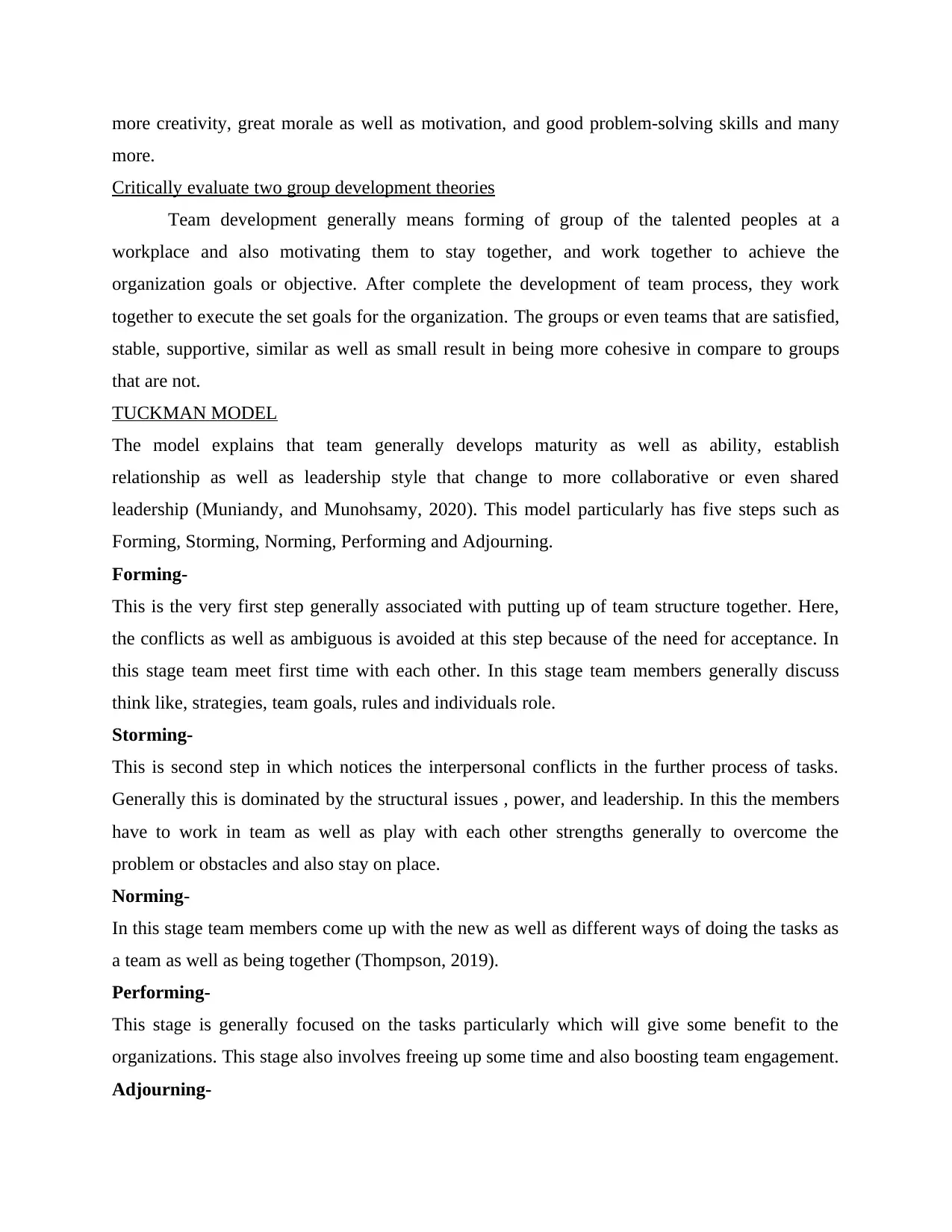
more creativity, great morale as well as motivation, and good problem-solving skills and many
more.
Critically evaluate two group development theories
Team development generally means forming of group of the talented peoples at a
workplace and also motivating them to stay together, and work together to achieve the
organization goals or objective. After complete the development of team process, they work
together to execute the set goals for the organization. The groups or even teams that are satisfied,
stable, supportive, similar as well as small result in being more cohesive in compare to groups
that are not.
TUCKMAN MODEL
The model explains that team generally develops maturity as well as ability, establish
relationship as well as leadership style that change to more collaborative or even shared
leadership (Muniandy, and Munohsamy, 2020). This model particularly has five steps such as
Forming, Storming, Norming, Performing and Adjourning.
Forming-
This is the very first step generally associated with putting up of team structure together. Here,
the conflicts as well as ambiguous is avoided at this step because of the need for acceptance. In
this stage team meet first time with each other. In this stage team members generally discuss
think like, strategies, team goals, rules and individuals role.
Storming-
This is second step in which notices the interpersonal conflicts in the further process of tasks.
Generally this is dominated by the structural issues , power, and leadership. In this the members
have to work in team as well as play with each other strengths generally to overcome the
problem or obstacles and also stay on place.
Norming-
In this stage team members come up with the new as well as different ways of doing the tasks as
a team as well as being together (Thompson, 2019).
Performing-
This stage is generally focused on the tasks particularly which will give some benefit to the
organizations. This stage also involves freeing up some time and also boosting team engagement.
Adjourning-
more.
Critically evaluate two group development theories
Team development generally means forming of group of the talented peoples at a
workplace and also motivating them to stay together, and work together to achieve the
organization goals or objective. After complete the development of team process, they work
together to execute the set goals for the organization. The groups or even teams that are satisfied,
stable, supportive, similar as well as small result in being more cohesive in compare to groups
that are not.
TUCKMAN MODEL
The model explains that team generally develops maturity as well as ability, establish
relationship as well as leadership style that change to more collaborative or even shared
leadership (Muniandy, and Munohsamy, 2020). This model particularly has five steps such as
Forming, Storming, Norming, Performing and Adjourning.
Forming-
This is the very first step generally associated with putting up of team structure together. Here,
the conflicts as well as ambiguous is avoided at this step because of the need for acceptance. In
this stage team meet first time with each other. In this stage team members generally discuss
think like, strategies, team goals, rules and individuals role.
Storming-
This is second step in which notices the interpersonal conflicts in the further process of tasks.
Generally this is dominated by the structural issues , power, and leadership. In this the members
have to work in team as well as play with each other strengths generally to overcome the
problem or obstacles and also stay on place.
Norming-
In this stage team members come up with the new as well as different ways of doing the tasks as
a team as well as being together (Thompson, 2019).
Performing-
This stage is generally focused on the tasks particularly which will give some benefit to the
organizations. This stage also involves freeing up some time and also boosting team engagement.
Adjourning-
⊘ This is a preview!⊘
Do you want full access?
Subscribe today to unlock all pages.

Trusted by 1+ million students worldwide
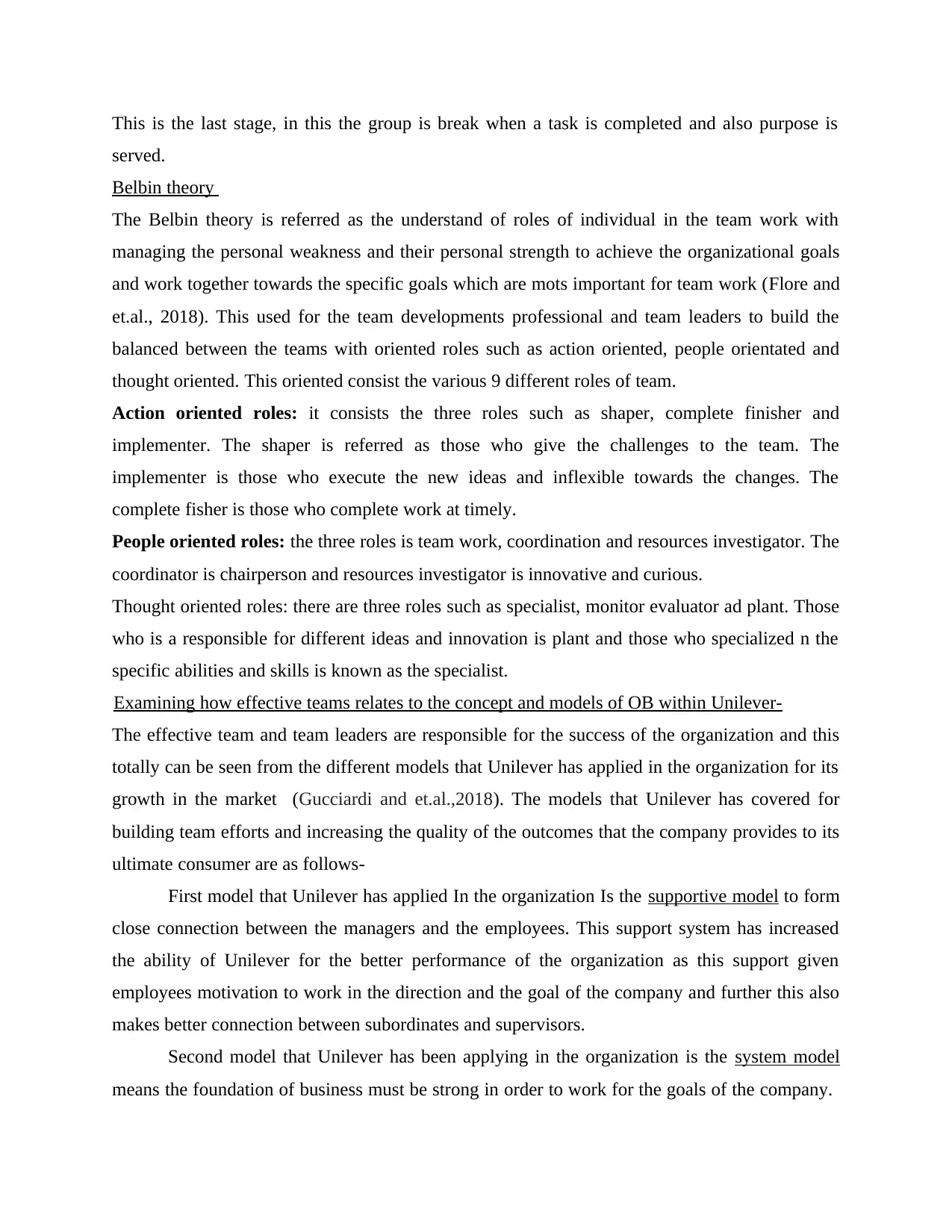
This is the last stage, in this the group is break when a task is completed and also purpose is
served.
Belbin theory
The Belbin theory is referred as the understand of roles of individual in the team work with
managing the personal weakness and their personal strength to achieve the organizational goals
and work together towards the specific goals which are mots important for team work (Flore and
et.al., 2018). This used for the team developments professional and team leaders to build the
balanced between the teams with oriented roles such as action oriented, people orientated and
thought oriented. This oriented consist the various 9 different roles of team.
Action oriented roles: it consists the three roles such as shaper, complete finisher and
implementer. The shaper is referred as those who give the challenges to the team. The
implementer is those who execute the new ideas and inflexible towards the changes. The
complete fisher is those who complete work at timely.
People oriented roles: the three roles is team work, coordination and resources investigator. The
coordinator is chairperson and resources investigator is innovative and curious.
Thought oriented roles: there are three roles such as specialist, monitor evaluator ad plant. Those
who is a responsible for different ideas and innovation is plant and those who specialized n the
specific abilities and skills is known as the specialist.
Examining how effective teams relates to the concept and models of OB within Unilever-
The effective team and team leaders are responsible for the success of the organization and this
totally can be seen from the different models that Unilever has applied in the organization for its
growth in the market (Gucciardi and et.al.,2018). The models that Unilever has covered for
building team efforts and increasing the quality of the outcomes that the company provides to its
ultimate consumer are as follows-
First model that Unilever has applied In the organization Is the supportive model to form
close connection between the managers and the employees. This support system has increased
the ability of Unilever for the better performance of the organization as this support given
employees motivation to work in the direction and the goal of the company and further this also
makes better connection between subordinates and supervisors.
Second model that Unilever has been applying in the organization is the system model
means the foundation of business must be strong in order to work for the goals of the company.
served.
Belbin theory
The Belbin theory is referred as the understand of roles of individual in the team work with
managing the personal weakness and their personal strength to achieve the organizational goals
and work together towards the specific goals which are mots important for team work (Flore and
et.al., 2018). This used for the team developments professional and team leaders to build the
balanced between the teams with oriented roles such as action oriented, people orientated and
thought oriented. This oriented consist the various 9 different roles of team.
Action oriented roles: it consists the three roles such as shaper, complete finisher and
implementer. The shaper is referred as those who give the challenges to the team. The
implementer is those who execute the new ideas and inflexible towards the changes. The
complete fisher is those who complete work at timely.
People oriented roles: the three roles is team work, coordination and resources investigator. The
coordinator is chairperson and resources investigator is innovative and curious.
Thought oriented roles: there are three roles such as specialist, monitor evaluator ad plant. Those
who is a responsible for different ideas and innovation is plant and those who specialized n the
specific abilities and skills is known as the specialist.
Examining how effective teams relates to the concept and models of OB within Unilever-
The effective team and team leaders are responsible for the success of the organization and this
totally can be seen from the different models that Unilever has applied in the organization for its
growth in the market (Gucciardi and et.al.,2018). The models that Unilever has covered for
building team efforts and increasing the quality of the outcomes that the company provides to its
ultimate consumer are as follows-
First model that Unilever has applied In the organization Is the supportive model to form
close connection between the managers and the employees. This support system has increased
the ability of Unilever for the better performance of the organization as this support given
employees motivation to work in the direction and the goal of the company and further this also
makes better connection between subordinates and supervisors.
Second model that Unilever has been applying in the organization is the system model
means the foundation of business must be strong in order to work for the goals of the company.
Paraphrase This Document
Need a fresh take? Get an instant paraphrase of this document with our AI Paraphraser
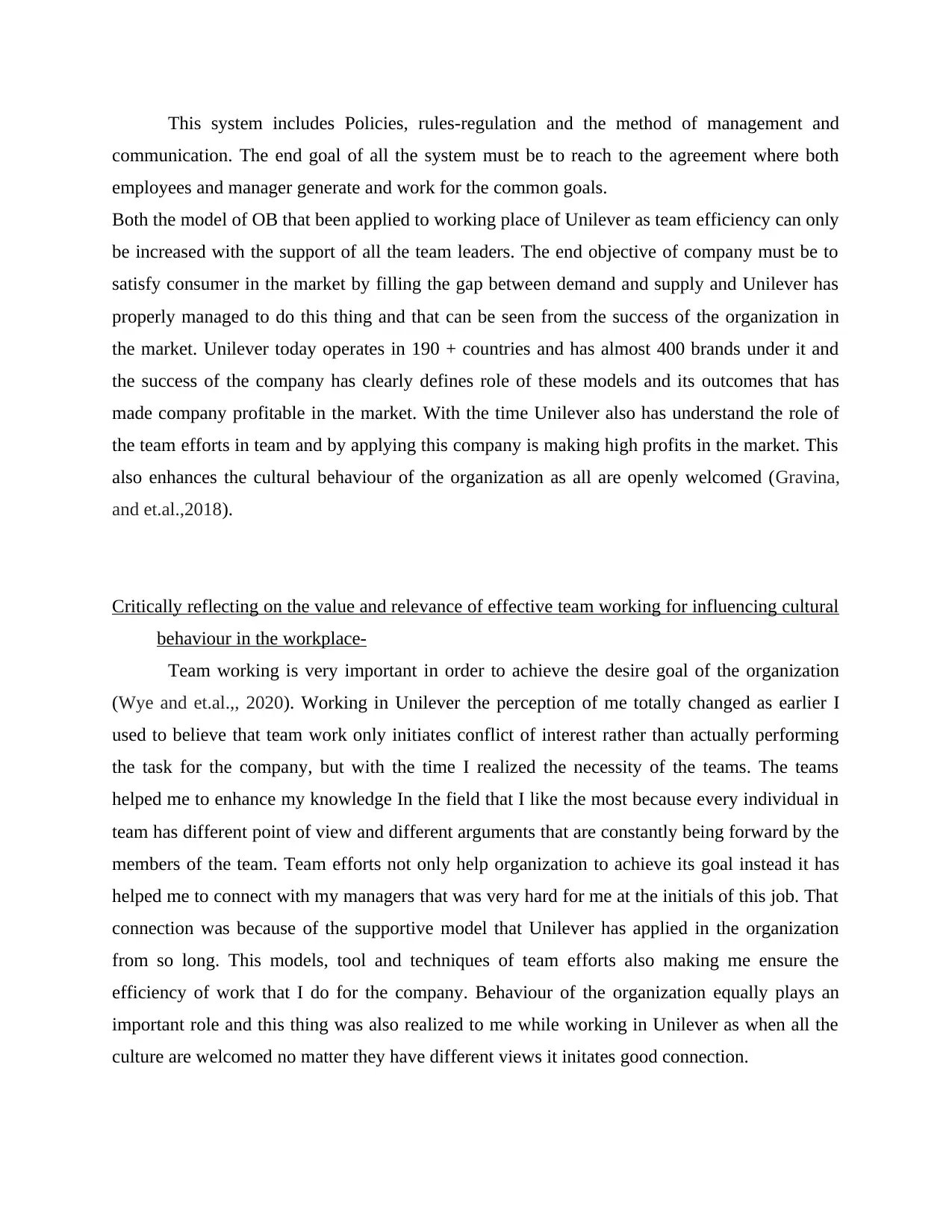
This system includes Policies, rules-regulation and the method of management and
communication. The end goal of all the system must be to reach to the agreement where both
employees and manager generate and work for the common goals.
Both the model of OB that been applied to working place of Unilever as team efficiency can only
be increased with the support of all the team leaders. The end objective of company must be to
satisfy consumer in the market by filling the gap between demand and supply and Unilever has
properly managed to do this thing and that can be seen from the success of the organization in
the market. Unilever today operates in 190 + countries and has almost 400 brands under it and
the success of the company has clearly defines role of these models and its outcomes that has
made company profitable in the market. With the time Unilever also has understand the role of
the team efforts in team and by applying this company is making high profits in the market. This
also enhances the cultural behaviour of the organization as all are openly welcomed (Gravina,
and et.al.,2018).
Critically reflecting on the value and relevance of effective team working for influencing cultural
behaviour in the workplace-
Team working is very important in order to achieve the desire goal of the organization
(Wye and et.al.,, 2020). Working in Unilever the perception of me totally changed as earlier I
used to believe that team work only initiates conflict of interest rather than actually performing
the task for the company, but with the time I realized the necessity of the teams. The teams
helped me to enhance my knowledge In the field that I like the most because every individual in
team has different point of view and different arguments that are constantly being forward by the
members of the team. Team efforts not only help organization to achieve its goal instead it has
helped me to connect with my managers that was very hard for me at the initials of this job. That
connection was because of the supportive model that Unilever has applied in the organization
from so long. This models, tool and techniques of team efforts also making me ensure the
efficiency of work that I do for the company. Behaviour of the organization equally plays an
important role and this thing was also realized to me while working in Unilever as when all the
culture are welcomed no matter they have different views it initates good connection.
communication. The end goal of all the system must be to reach to the agreement where both
employees and manager generate and work for the common goals.
Both the model of OB that been applied to working place of Unilever as team efficiency can only
be increased with the support of all the team leaders. The end objective of company must be to
satisfy consumer in the market by filling the gap between demand and supply and Unilever has
properly managed to do this thing and that can be seen from the success of the organization in
the market. Unilever today operates in 190 + countries and has almost 400 brands under it and
the success of the company has clearly defines role of these models and its outcomes that has
made company profitable in the market. With the time Unilever also has understand the role of
the team efforts in team and by applying this company is making high profits in the market. This
also enhances the cultural behaviour of the organization as all are openly welcomed (Gravina,
and et.al.,2018).
Critically reflecting on the value and relevance of effective team working for influencing cultural
behaviour in the workplace-
Team working is very important in order to achieve the desire goal of the organization
(Wye and et.al.,, 2020). Working in Unilever the perception of me totally changed as earlier I
used to believe that team work only initiates conflict of interest rather than actually performing
the task for the company, but with the time I realized the necessity of the teams. The teams
helped me to enhance my knowledge In the field that I like the most because every individual in
team has different point of view and different arguments that are constantly being forward by the
members of the team. Team efforts not only help organization to achieve its goal instead it has
helped me to connect with my managers that was very hard for me at the initials of this job. That
connection was because of the supportive model that Unilever has applied in the organization
from so long. This models, tool and techniques of team efforts also making me ensure the
efficiency of work that I do for the company. Behaviour of the organization equally plays an
important role and this thing was also realized to me while working in Unilever as when all the
culture are welcomed no matter they have different views it initates good connection.
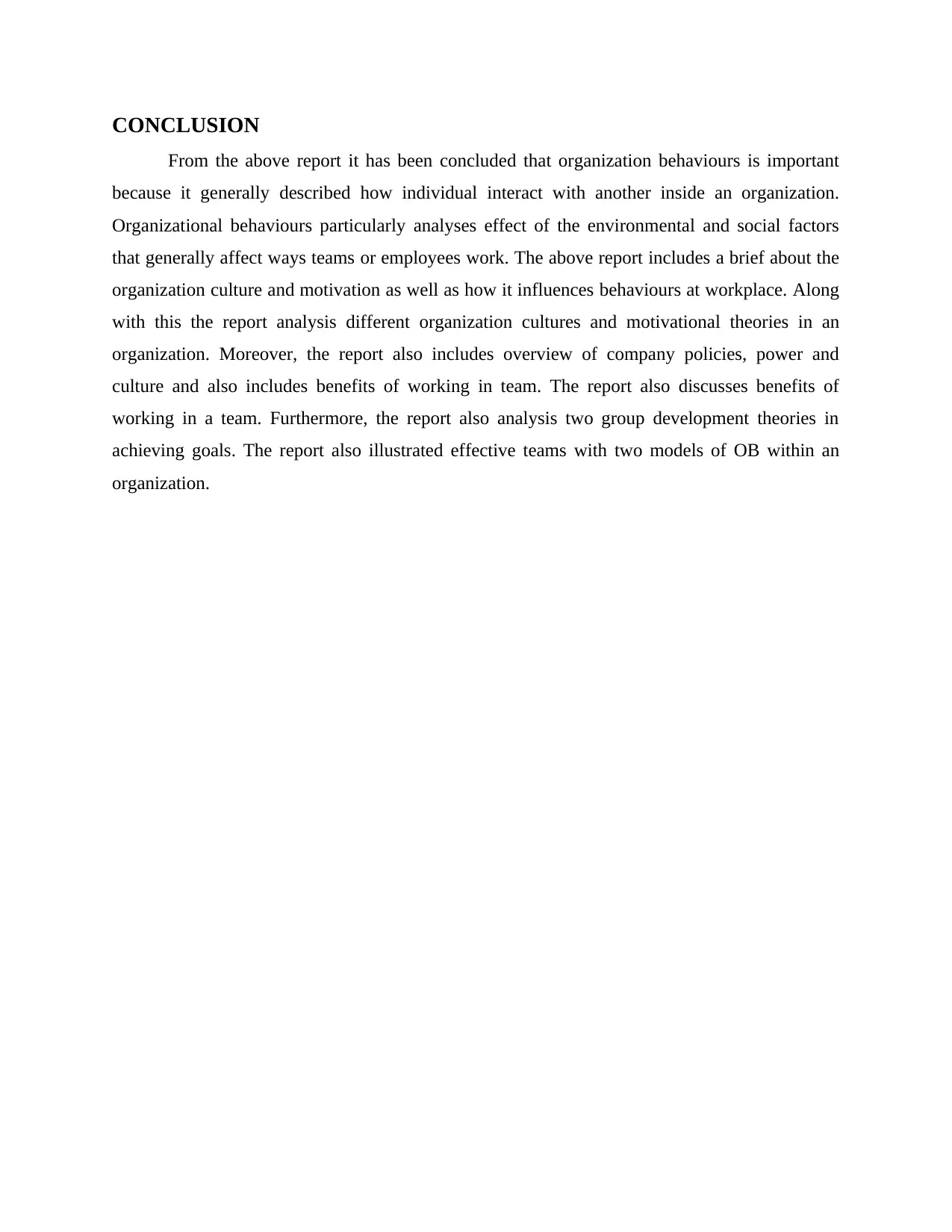
CONCLUSION
From the above report it has been concluded that organization behaviours is important
because it generally described how individual interact with another inside an organization.
Organizational behaviours particularly analyses effect of the environmental and social factors
that generally affect ways teams or employees work. The above report includes a brief about the
organization culture and motivation as well as how it influences behaviours at workplace. Along
with this the report analysis different organization cultures and motivational theories in an
organization. Moreover, the report also includes overview of company policies, power and
culture and also includes benefits of working in team. The report also discusses benefits of
working in a team. Furthermore, the report also analysis two group development theories in
achieving goals. The report also illustrated effective teams with two models of OB within an
organization.
From the above report it has been concluded that organization behaviours is important
because it generally described how individual interact with another inside an organization.
Organizational behaviours particularly analyses effect of the environmental and social factors
that generally affect ways teams or employees work. The above report includes a brief about the
organization culture and motivation as well as how it influences behaviours at workplace. Along
with this the report analysis different organization cultures and motivational theories in an
organization. Moreover, the report also includes overview of company policies, power and
culture and also includes benefits of working in team. The report also discusses benefits of
working in a team. Furthermore, the report also analysis two group development theories in
achieving goals. The report also illustrated effective teams with two models of OB within an
organization.
⊘ This is a preview!⊘
Do you want full access?
Subscribe today to unlock all pages.

Trusted by 1+ million students worldwide
1 out of 13
Related Documents
Your All-in-One AI-Powered Toolkit for Academic Success.
+13062052269
info@desklib.com
Available 24*7 on WhatsApp / Email
![[object Object]](/_next/static/media/star-bottom.7253800d.svg)
Unlock your academic potential
Copyright © 2020–2025 A2Z Services. All Rights Reserved. Developed and managed by ZUCOL.





